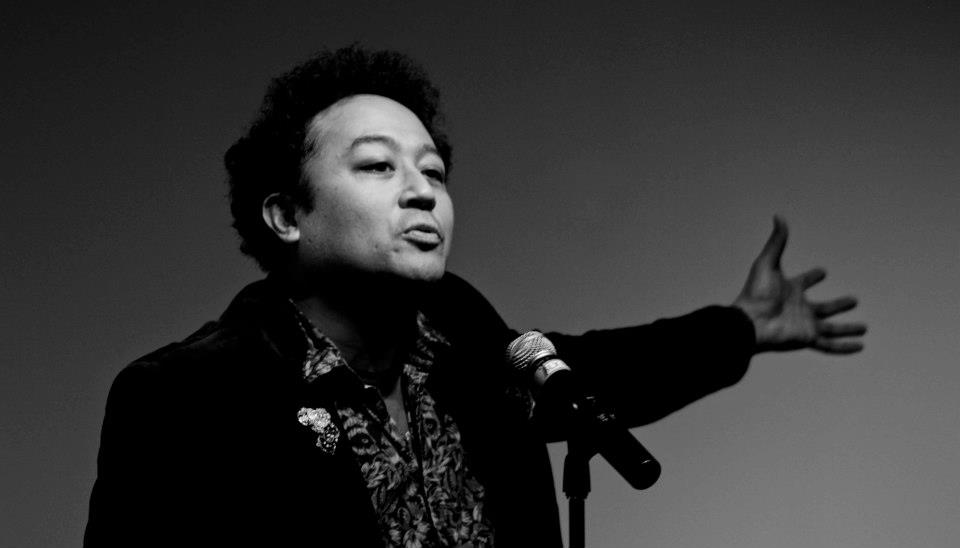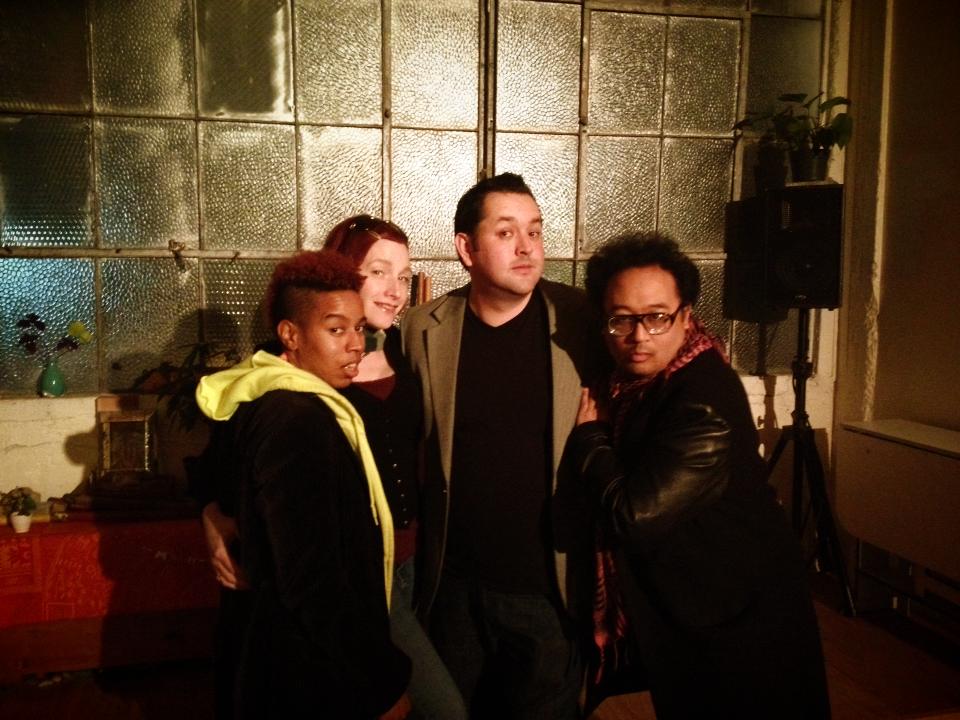P&W-funded Regie Cabico is the coeditor, with poet and novelist Brittany Fonte, of the recently published anthology of queer poetry and spoken word, Flicker and Spark (Lowbrow Press). His own work has appeared in over thirty anthologies, including Aloud: Voices from the Nuyorican Poets Café, Spoken Word Revolution, and Chorus & The Outlaw Bible of American Poetry. He received the 2006 Writers for Writers Award from Poets & Writers for his work teaching at-risk youth at Bellevue Hospital in New York. He is a former Artist in Residence at NYU's Asian Pacific American Studies Program and has served as faculty at Banff's Spoken Word Program. He resides in Washington, D.C.

I recently flew to Oakland to jump-start the debut of Cupid Ain’t @#$%!: An Anti-Valentine’s Day Poetry Movement. The series, started by J. Mase the III, has a strong, queer spoken-word bent, with poets of color and queer allies coming together to rail not just about love, but also about political identity through a humor and candor that you don’t get in a lot of poetry readings. In its fifth year, the series has gone to Philadelphia, New York, Washington, D.C., and Oakland. Having performed as a gay Filipino poet for the last twenty years, it occurred to me that the Cupid Movement is giving voice to a queer culture that embraces queer allies and also fosters an intergenerational queer positive environment.
I flew in from Washington, D.C., and into The Living Room Project, an Oakland-based organization devoted to healing, wellness, and serving the queer community. I rode the BART with poet Baruch Porras Hernandez, who curates the Queer Open Mic, the longest running series in the Bay. We were later joined by J. Mase, who flew in from Chicago, as well as trans comedian Natasha Muse. The Cupid show brought in an intimate crowd of a dozen or so: mainly queer folks who heard about the show from queer artists they had been following from New York. Deb Malkin, a college friend and her girlfriend, Cholla Soledad, showed up and made the reading a Valentine’s Day compromise—since Cholla is an anti-V-day cupid-downer. Deb is a Libra romantic. As a poet who performs constantly, you never know who will come or how many folks will show up.
 Mase’s poem “Neighbor” was a big hit. The poem is about a homophobic neighbor who gives Mase nasty stares: “Queer people fuck better...and you know it because you live next door...to me.” Baruch’s poem on being “thin” is the best queer poem on body image: “If I were thin I would move a pile of needles naked from one room to another...and sleep with so many skinny boys in my bed because I’d be thin and we can lie in a line on the bed...” Natasha Muse broke her stand-up set into progressions during which she spoke of coming out as trans, starting out as Ewan McGregor and then ending up looking like Nicole Kidman, so watching Moulin Rouge hits her in a very personal way. Natasha concluded her set by talking about becoming a mom and living with her female spouse. The evening had some of the best comedic queer material that I have come across. The owner of The Living Room Project, Micah Hobbes, was impressed by the talent and acknowledged humor as a healing tool.
Mase’s poem “Neighbor” was a big hit. The poem is about a homophobic neighbor who gives Mase nasty stares: “Queer people fuck better...and you know it because you live next door...to me.” Baruch’s poem on being “thin” is the best queer poem on body image: “If I were thin I would move a pile of needles naked from one room to another...and sleep with so many skinny boys in my bed because I’d be thin and we can lie in a line on the bed...” Natasha Muse broke her stand-up set into progressions during which she spoke of coming out as trans, starting out as Ewan McGregor and then ending up looking like Nicole Kidman, so watching Moulin Rouge hits her in a very personal way. Natasha concluded her set by talking about becoming a mom and living with her female spouse. The evening had some of the best comedic queer material that I have come across. The owner of The Living Room Project, Micah Hobbes, was impressed by the talent and acknowledged humor as a healing tool.
Photos: (Top) Regie Cabico. Credit: Carlos Rodriguez (Bottom) From left to right: J Mase III, Natasha Muse, Baruch Porras-Hernandez, Regie Cabico.
Support for Readings/Workshops events in Washington, D.C. is provided by an endowment established with generous contributions from the Poets & Writers Board of Directors and others. Additional support comes from the Friends of Poets & Writers.






 Mase’s poem “Neighbor” was a big hit. The poem is about a homophobic neighbor who gives Mase nasty stares: “Queer people fuck better...and you know it because you live next door...to me.” Baruch’s poem on being “thin” is the best queer poem on body image: “If I were thin I would move a pile of needles naked from one room to another...and sleep with so many skinny boys in my bed because I’d be thin and we can lie in a line on the bed...” Natasha Muse broke her stand-up set into progressions during which she spoke of coming out as trans, starting out as Ewan McGregor and then ending up looking like Nicole Kidman, so watching Moulin Rouge hits her in a very personal way. Natasha concluded her set by talking about becoming a mom and living with her female spouse. The evening had some of the best comedic queer material that I have come across. The owner of The Living Room Project, Micah Hobbes, was impressed by the talent and acknowledged humor as a healing tool.
Mase’s poem “Neighbor” was a big hit. The poem is about a homophobic neighbor who gives Mase nasty stares: “Queer people fuck better...and you know it because you live next door...to me.” Baruch’s poem on being “thin” is the best queer poem on body image: “If I were thin I would move a pile of needles naked from one room to another...and sleep with so many skinny boys in my bed because I’d be thin and we can lie in a line on the bed...” Natasha Muse broke her stand-up set into progressions during which she spoke of coming out as trans, starting out as Ewan McGregor and then ending up looking like Nicole Kidman, so watching Moulin Rouge hits her in a very personal way. Natasha concluded her set by talking about becoming a mom and living with her female spouse. The evening had some of the best comedic queer material that I have come across. The owner of The Living Room Project, Micah Hobbes, was impressed by the talent and acknowledged humor as a healing tool.